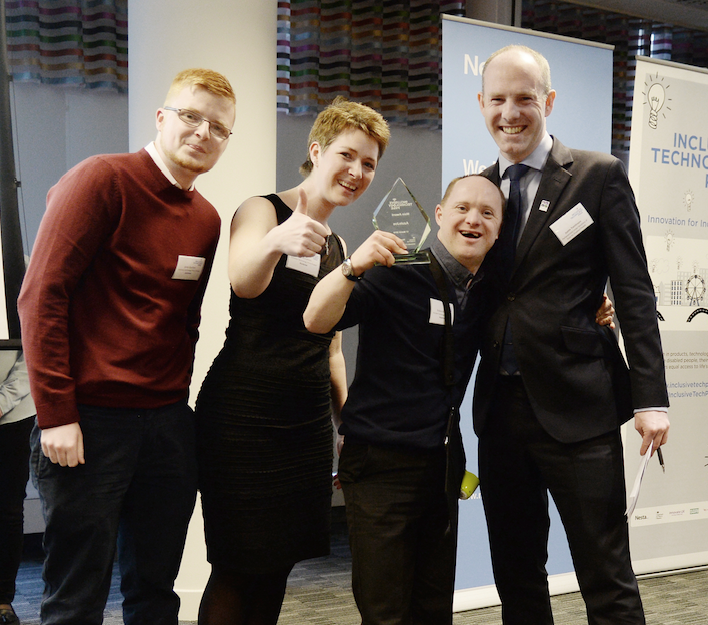It’s been an astonishing few weeks in the UK’s political system with lots of change. One of the less reported aspects was the replacement of Justin Tomlinson MP as Parliamentary Under Secretary of State for Disabled People. To editorialise, although I was and remain opposed to the government’s approach to disability, I’ve met Justin, and he clearly valued people in ways that were important to me (he’s also got a good record on transparency). He was gracious enough to grant us an interview.

What’s the achievement that you are most proud of in your role as Minister?
It’s difficult to focus on just one thing but I’d have to say I’m most proud of how many more disabled people are now in employment. Our latest figures show that 360,000 more disabled people are now in employment compared to 2 years ago. That’s massive progress considering the time frame in which we’ve been working, and it’s exciting because it shows that attitudes to disabled people in this country are shifting in the right direction. If we can make employment accessible, on a practical and on a social level, that is a powerful indicator that the reforms we’ve introduced and the campaigns we’ve launched are working.
What’s was biggest problem facing your office day-to-day?
It has to be the sheer scale of what the office is trying to do. In particular, changing the way people think about people with disabilities. This takes time – and a lot of patience. But the many little victories we saw every day made all the hard work worthwhile and were evidence that we were making progress.
I’ve also learned that it’s not just policy that effects positive change – some of the most valuable work happens more indirectly. When the right people are in the room we can get things done that Government intervention alone may not have achieved. For example our work on the built environment, which focuses on accessibility as integral to design, was born out of the desire to make the Paralympic Games in 2012 the most accessible games ever. We’ve continued that commitment and the work has recently been handed over to the Construction Industry Council. Another highlight from this year was my involvement in the Inclusive Technology prize. And recently I was really excited to announce a new taskforce that will be looking into how we can make apprenticeships more accessible for people with learning disabilities – these and other wins inspire me to keep pressing forward.
We’ve continued that commitment and the work has recently been handed over to the Construction Industry Council. Another highlight from this year was my involvement in the Inclusive Technology prize, won this year by Joe Reddington for his communications aid Azule Joe – his software will allow people who are unable to speak, like Joe’s brother, to communicate fully with friends and family. He now has a £50,000 contract that will turn his prototype into reality. And recently I was really excited to announce a new taskforce that will be looking into how we can make apprenticeships more accessible for people with learning disabilities.
Although we know relatively little about how disability affects people’s voting intention the It’s clear that the majority disability campaigners, organisations, and other groups are strongly left-of-centre. Does that make the job much harder than it would be for, say, Jonathan Shaw who was the last left-of-centre MP to hold the equivalent role?
To be honest, in the hundreds and hundreds of meetings I had, politics has never come up. I’m 100% committed to getting disabled people the help they need – be it extra support to get a job, or through reducing barriers to accessibility – and I’ve found that the people I’ve been working with, regardless of their political leanings, just want to get on with that important work.
To ask a slightly unusual question – we’re seeing more and more cases of bright children from migrant backgrounds being wrongly identified as having special education needs (see, e.g., http://www.ioe.ac.uk/56528.html) do you have any thoughts on how best to deal with this from a special needs perspective?
It’s crucial that we continue to support all children in their education, and we’ve done a lot of work in the area of Special Educational Needs and Disability (SEND). Just 20 months ago the Department for Education made fundamental changes to the way the SEND support system works for families – the biggest in a generation. These put children and young people with SEND at the heart of the process, ensuring that they are supported all the way through to adulthood. Since then 74,000 young people have been given personalised education, health and care (EHC) plans. Schools have a vital role to play in this work, which is why the overall school budget has been protected and funding increased by over £90 million this year for children and young people with high needs. The Department for Education is also funding a contract worth just under £500k over one year to support theworkforce in the implementation of the SEND reforms through helping teachers and schools to access practical support and appraise how mosteffectively to work with those with SEND, including effective commissioning of support embedding good practice and assessing coverage of thepreparing for adulthood outcomes. These measures are aimed at making sure support is targeted to suit an individual child’s circumstance, regardless of their background.
